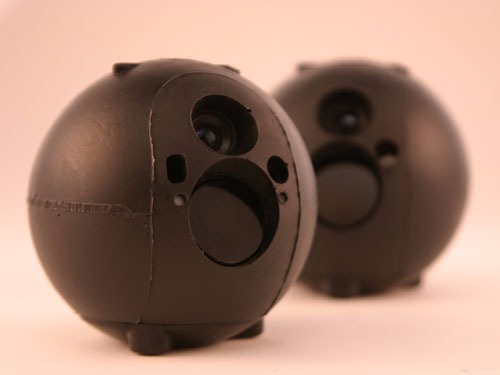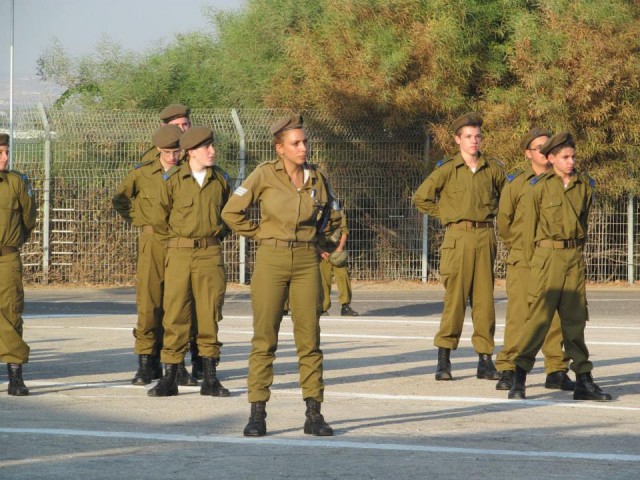High School Students Emerge as the IDF’s Next Tech Pioneers
A special IDF program coordinates technology training for Israeli high-school students. After they graduate, the students join the ranks of the IDF’s most talented innovators, computer programmers and technology experts.
In August of 2013, dozens of Israeli high-school students marched toward the stage during an IDF ceremony. The teenagers, dressed in olive-green uniforms, waved Israeli flags and celebrated with family members at a major IDF training base. Although the students were no older than 15 – three years behind Israel’s required age for military service – they marked their formal transition into the IDF. Earlier this school year, they began a special program for high schoolers with the IDF's Teleprocessing Corps.
![]()

“We work with students who enter the IDF formally in the ninth or tenth grade,” explains Lieutenant Colonel Ronen Azaria, the program’s founding director and the former Head of the Technology and Training Branch at the School for Teleprocessing, who recently transitioned into a new role. The technology track, now in its second year, leads programming for IDF "cadets" at seven high schools across the country. Students who take part in the program experience the daily routine of IDF soldiers – coming to class in uniform and participating in activities under the supervision of IDF commanders.
The elite program prepares the students to serve as soldiers in the Teleprocessing Corps. Like other students, the cadets study basic subjects like math, social studies, civics and English – but also take advanced courses in technology taught by high-school teachers. Once they graduate and reach the military as full recruits r, they join the ranks of soldiers managing the IDF’s technology and telecommunications systems.
“The teleprocessing system of the IDF stands out as one of the most advanced in the world,” Lt. Col. Azaria explains. “We need the best people there. That’s why we identify soldiers as young cadets – and train them the whole time they’re in high school – so that they’ll grow and follow the path of the Teleprocessing Corps.”
The Teleprocessing Corps contributes to the military’s rapid technological growth, preparing the IDF to confront enemies who seek to harm Israel. The IDF's Lotem-C4i Technological Division, for example, develops technologies to thwart attacks and bolster Israel’s defenses against cyberwarfare.
![]()

Lotem-C4i leads the IDF’s cyber battlefront, deflecting threats to Israel’s security.
The Center of Computers and Information Systems trains Israel's next generation of computer programmers – teaching them to enhance the IDF’s strategic and administrative systems. Throughout the IDF, soldiers stand at the forefront of global defense technology – developing Unmanned Ground Vehicles that patrol Israel’s borders, defense systems that destroy enemy rockets, and devices that allow soldiers to see around corners when entering a house filled with terrorists.


EyeBall R1 Surveillance Device lets IDF soldiers see around corners
An increasing number of soldiers in the Teleprocessing Corps enter their roles with specialized technology skills. For this reason, commanders from the Teleprocessing Corps provide customized guidance to the high schoolers in the cadet program. “Commanders are dispersed throughout the schools,” Lt. Col. Azaria explains. “Their responsibility is to help students outside of their coursework, and teach them lessons that reinforce their knowledge of the material.”
Investing in Israeli youth
The commanders act as counselors for the cadets, providing them with personal support while overseeing a disciplinary system that resembles the structure of the military. The commanders mentor the cadets throughout their high school years – from their first moments in the program until the day they graduate.
“There is a very close connection between the IDF and the students,” Lt. Col. Azaria says. “The participants make special visits to IDF units, and we come to them with presentations on cyber defense, satellite technology and other subjects. There are several lectures focused on training, and in the twelfth grade, we speak with them about opportunities for placement in the Teleprocessing Corps.”
By serving as role models for the students, the commanders fulfill one of the program’s central goals – increasing the motivation of Israeli youth to serve in the IDF. “The fact that there are both soldiers and students in uniform inside of the school raises the motivation of the entire school to enlist,” Lt. Col. Azaria says. “This emphasizes the important values of discipline, excellence and personal example. The students serve as examples for their friends to enlist in the military and take part in the important mission to defend the State of Israel.”


The program reflects the Telecommunication Corps’ broader efforts to invest in Israeli youth. In a recent initiative resembling the cadets program, 90 officers and soldiers from the Telecommunications Corps visited Israeli schools across the country to explain the basics of online safety. Another program teaches teenage women the basics of computer technology and prepares them for technology roles – emphasizing the IDF’s strong focus on gender integration.
According to Lt. Col. Azaria, the students finish high school with ten units of course credit in electronics – the most advanced level of credit in Israeli high schools. In addition, students may pursue advanced training in electrical engineering financed almost completely by the Teleprocessing Corps.
“After [the program], the students are capable of working as electricians or serving in similar roles in the Telecommunications Corps. They strengthen these skills through their training at the beginning of military service,” Lt. Col. Azaria says. “IDF service truly gives young people the opportunity to acquire the tools for success in civilian life.”

